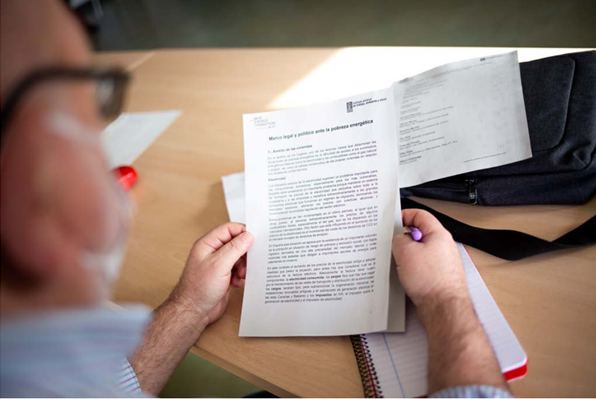National Expert Meetings: Experts’ Views on a Fair Energy Transition

© ISTAS
9 March 2022
The first steps have been taken: During the dialogue phase, participants from nine European countries shared their views on the energy transition and on how to make it fair. Now, the next project stage is underway: In each country, we are discussing the takeaways from the respective national focus groups with national-level policy experts – politicians, academics, members of the public administration, representatives of business and industry associations, and NGO representatives.
There will be up to three ‘National Expert Meetings’ in each country. The first objective of these meetings is to ensure that the national-level experts understand the circumstances of vulnerable citizens in their country and the hardships they expect to face during the energy transition. On this basis, the experts elaborate draft workable policy recommendations that address vulnerable people’s needs. In a final step, the national experts evaluate their own recommendations in order to identify possible trade-offs and blind spots. In several countries, the first expert group meetings were held in January and February.
Finding the right tools
In Belgium, the experts were not surprised by the results obtained in the focus groups. They considered the energy transition currently to be neither fair nor inclusive. Many groups are excluded from the measures or simply do not have genuine access to them – a problem that was also addressed during the first expert group meetings in Germany and in the Netherlands. Some groups can be hard to reach because of language barriers, because they are less digitally skilled or because of their distrust in institutions. The mere identification of vulnerable groups can also be a problem.
The experts therefore identified a need for properly focused communication and tools designed for vulnerable people since current incentives did not work for everyone. They called for a tailor-made approach to meet the concerns of vulnerable groups.
A local and personal approach
Spanish experts discussed the importance of better coordination between municipalities, social and other services: When a home in Catalonia, for instance, is not paying its electricity bills, supply companies do not cut power directly. First, they get in touch with the city council to make sure that vulnerable groups are not concerned. Through the information provided by the supply companies, the municipalities are able to detect people in a situation of poverty of whom they have not been aware before.
Cooperation among various organizations has further advantages: The Dutch and Belgian expert groups stressed the importance of human relationships as a key factor for reaching concerned people. Organizations that are already in contact with them can help to establish a direct and personal approach. Rather than complex measures on a national level, Belgian experts advocated simple and local measures that could ensure a greater involvement from vulnerable people. In Germany, the experts also called for institutions designed to implement policies on a local level.
The discussions will be resumed to draft specific policy recommendations. The results of the ‘National Expert Meetings’ in each country will be discussed in national Fair Energy Forums, the second listening phase, with participants of the local focus groups.
